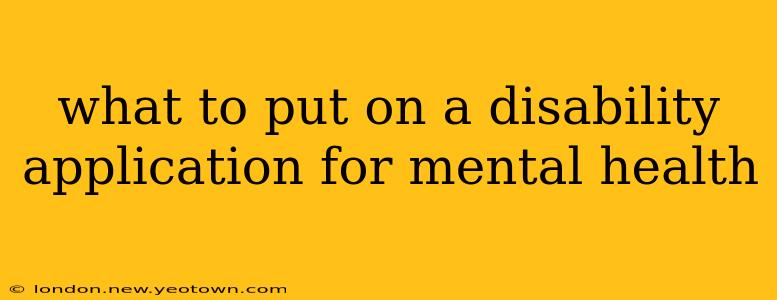Navigating the Disability Application Maze: What to Include for Mental Health Conditions
Applying for disability benefits due to mental health challenges can feel overwhelming. The process requires careful documentation and a clear presentation of your condition's impact on your daily life. This isn't just about listing diagnoses; it's about painting a comprehensive picture of how your mental health affects your ability to work. Think of it as telling your story, backed by evidence.
This isn't legal advice, and the specifics vary by country and governing body. Always consult with a legal professional or disability advocate for personalized guidance.
1. Gathering Your Evidence: The Foundation of Your Application
Before even starting the application, assemble your supporting documents. This is crucial. Think of it as building a strong case. The stronger the evidence, the better your chances. This includes:
-
Diagnosis and Treatment Records: These are your most valuable assets. Gather all records from your psychiatrist, therapist, psychologist, or other mental health professionals. Include dates of diagnoses, treatment plans, medication lists (with dosages and side effects), therapy notes, and results of any psychological testing (like IQ tests or personality assessments). The more comprehensive the documentation, the better.
-
Hospitalization Records: If you've experienced inpatient treatment, these are essential. They often provide a detailed picture of the severity of your condition at a particular time.
-
Medical Test Results: Blood work, brain scans (if applicable), or other relevant tests should be included.
-
Notes from Other Healthcare Providers: If your mental health condition impacts other areas of your health (sleep, appetite, etc.), include notes from your primary care physician or specialists addressing these issues.
-
Work History: Document your work history, detailing any jobs held, dates of employment, and reasons for leaving previous positions. If your mental health contributed to job loss or inability to maintain employment, explicitly state this.
2. Completing the Application: Telling Your Story
The application itself will ask for detailed information about your symptoms and their impact. Don't be vague; be specific. The key is to connect your symptoms to your functional limitations. Here's how to approach different sections:
What are the symptoms of my mental health condition?
List your specific symptoms, such as anxiety, depression, panic attacks, difficulty concentrating, memory problems, insomnia, social withdrawal, or changes in mood. Describe the frequency, intensity, and duration of each symptom. Use quantifiable details when possible ("I experience panic attacks approximately three times per week, lasting for 30-45 minutes each").
How do my symptoms affect my ability to work?
This is the most critical part. Don't just say "I'm depressed and can't work." Instead, explain how your symptoms prevent you from performing job duties. For example:
- Concentration and Memory: "Due to persistent difficulty concentrating and memory problems, I'm unable to complete tasks accurately or efficiently. I frequently forget instructions or deadlines."
- Social Interaction: "My social anxiety prevents me from interacting effectively with coworkers or clients, hindering my ability to collaborate on projects or maintain professional relationships."
- Emotional Regulation: "My frequent mood swings and emotional instability make it difficult to maintain composure in a workplace setting, potentially leading to conflict or compromised performance."
- Physical Symptoms: "The physical symptoms of my anxiety, such as nausea and tremors, significantly impair my ability to perform my job duties."
What treatments have I tried?
Detail all treatments you've undergone, including therapy types, medication, and any alternative treatments. Note the effectiveness of each treatment and any side effects experienced.
3. Seeking Professional Help:
Navigating this process independently can be challenging. Consider these options:
- Disability Advocate: An advocate can guide you through the application process, help gather documentation, and represent you before the disability board.
- Mental Health Professional: Your therapist or psychiatrist can provide crucial information and support, potentially writing letters of support for your application.
- Legal Counsel: If your application is denied, legal representation can be invaluable.
Remember, honesty and detailed documentation are key to a successful disability application. Be patient and persistent – the process can take time, but with careful preparation, you can strengthen your claim. This journey requires resilience, and seeking support is a sign of strength, not weakness.

